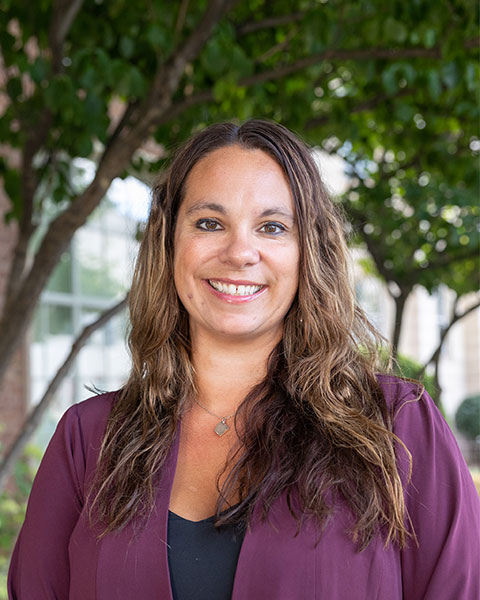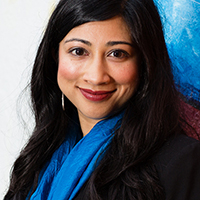Back
Feminist Scholarship
The Social Work Gaze and Academy
Academic Mothers: A Discussion on More Equitable Structural Policies in the Academy
Friday, November 11, 2022
3:00 PM – 3:30 PM
Location: Palisades

Cristina Mogro-Wilson, MSW, PhD
Professor
University of Connecticut, School of Social Work
Hartford, Connecticut, United States
Nalini Negi, PhD
Associate Professor
University of Maryland, United States
Author and Presenter(s)
Co-Author and Presenter(s)
Overview: The pandemic has placed an additional stress on academic mother’s scientific output and availability for leadership roles. There needs to be more equitable structural policies including paid family leave, reduced workload after childbirth, and childcare support. This discussion will center on structural change that can be implemented.Proposal text: Introduction
The impact of COVID-19 has brought attention to the issues that academic mother’s face (“mothers” is inclusive of all who identify as a mother). The pandemic has placed an additional stress on academic mother’s scientific output and availability for leadership roles. Among BIPOC academic mothers, the demand has mounted to take on additional teaching or educational responsibilities related to anti-racist practice and social justice. We believe that as social work researchers we are well positioned to meet this challenging time to develop an academic culture that helps us refocus on what matters most, redefine excellence in teaching, service, and research, and make academic practice more equitable.
Methodology
The Editor in chief of the Journal of Social Work Education noted a gap in the social work literature and invited the two authors of this abstract to create a manuscript filling this void. To this end, we convened a group of 15 social work academic mothers of young children, representing various identities and circumstances, to offer intersectional perspectives to better understand the effect of the COVID-19 pandemic and existing racial/gender disparities on teaching and mentoring, research and scholarship pre- and post- tenure, administration, and work–life balance. We held multiple zoom meetings brainstorming and thinking about the issues that Academic mothers face, and how this impacts our lives in our different roles as members of BIPOC communities, pre tenure, post tenure, administrators, or at teaching vs. research focused institutions. We created small groups that wrote together about their experiences in these focused areas. After writing in small groups, we developed recommendations for solutions to the academy.
Results
The results include recommendations in the primary areas of: racial disparities/intersectionality, teaching and mentoring, research and scholarship pre and post tenure, administrative roles, and the work life balance. There are too many recommendations to list and discuss here however some included more equitable structural policies including paid family leave, reduced workload after childbirth, and childcare support. Together, as academic mothers, we call for a fundamental and structural change in the social work academy that is truly centered in equity and social justice.
Conclusions
As the pandemic rages on, there has been a collective institutional silence regarding this historic hardship on academic mothers in social work, and there have been no policies to rectify the continued exacerbation of gendered and racialized inequities. This is even as accounts from the social work academy have emerged of academic mothers being stretched to balance research, teaching, and service work in, first, online platforms with virtually no separation between work and home (an almost impossible feat with a very young child requiring constant supervision), and most recently, in-person with continuous disruptions due to daycare or school closures. This presentation will focus on presenting our findings and then engage in discussion for more recommendations and solutions to help support academic mothers in their roles.
The impact of COVID-19 has brought attention to the issues that academic mother’s face (“mothers” is inclusive of all who identify as a mother). The pandemic has placed an additional stress on academic mother’s scientific output and availability for leadership roles. Among BIPOC academic mothers, the demand has mounted to take on additional teaching or educational responsibilities related to anti-racist practice and social justice. We believe that as social work researchers we are well positioned to meet this challenging time to develop an academic culture that helps us refocus on what matters most, redefine excellence in teaching, service, and research, and make academic practice more equitable.
Methodology
The Editor in chief of the Journal of Social Work Education noted a gap in the social work literature and invited the two authors of this abstract to create a manuscript filling this void. To this end, we convened a group of 15 social work academic mothers of young children, representing various identities and circumstances, to offer intersectional perspectives to better understand the effect of the COVID-19 pandemic and existing racial/gender disparities on teaching and mentoring, research and scholarship pre- and post- tenure, administration, and work–life balance. We held multiple zoom meetings brainstorming and thinking about the issues that Academic mothers face, and how this impacts our lives in our different roles as members of BIPOC communities, pre tenure, post tenure, administrators, or at teaching vs. research focused institutions. We created small groups that wrote together about their experiences in these focused areas. After writing in small groups, we developed recommendations for solutions to the academy.
Results
The results include recommendations in the primary areas of: racial disparities/intersectionality, teaching and mentoring, research and scholarship pre and post tenure, administrative roles, and the work life balance. There are too many recommendations to list and discuss here however some included more equitable structural policies including paid family leave, reduced workload after childbirth, and childcare support. Together, as academic mothers, we call for a fundamental and structural change in the social work academy that is truly centered in equity and social justice.
Conclusions
As the pandemic rages on, there has been a collective institutional silence regarding this historic hardship on academic mothers in social work, and there have been no policies to rectify the continued exacerbation of gendered and racialized inequities. This is even as accounts from the social work academy have emerged of academic mothers being stretched to balance research, teaching, and service work in, first, online platforms with virtually no separation between work and home (an almost impossible feat with a very young child requiring constant supervision), and most recently, in-person with continuous disruptions due to daycare or school closures. This presentation will focus on presenting our findings and then engage in discussion for more recommendations and solutions to help support academic mothers in their roles.
Learning Objectives:
- Participants will learn about the coming together of Academic Mothers to write an invited article for JSWE on the issues and solutions during the pandemic.
- Participants will be able to articulate the issues and potential solutions for academic mothers during the pandemic in the primary domains of: racial disparities/intersectionality; education, teaching and mentoring; research and scholarship pre and post tenure; administrative roles; Work-Life balance/home life.
- Participants will be involved in discussion and brainstorming around developing an academic culture that helps us refocus on what matters most; redefine excellence in teaching, service, and research; and make academic practice more equitable.
